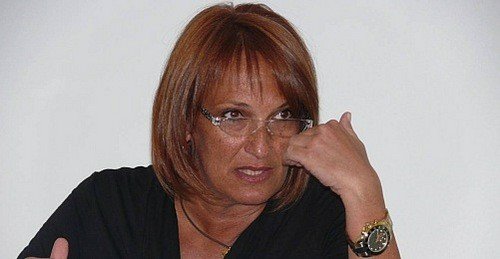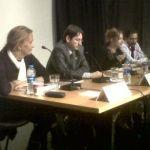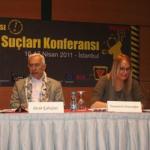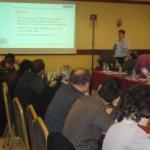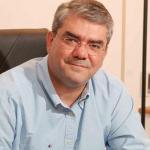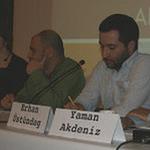A conference entitled "Hate discourses in the national media", organised by the Social Change Association, brought together critics of the mainstream media in Turkey.
İnceoğlu: Media needs to be responsible and monitored
Prof. Dr. Yasemin İnceoğlu, lecturer at the Galatasaray University's communication faculty, argued that the media should not polarise, but rather act responsibly and with good intentions, showing democratic attitudes and mutual respect. This would offer a positive contribution to the media landscape.
She said that the media in Turkey was a channel to reproduce official ideology, supporting nationalist and racist discourses, preparing the ground for othering others and even lynching attempts.
She suggested that there be more monitoring of the news coverage process.
Of the 56 member states of the OSCE, only 15 were taking preventative measures against hate discourses, so İnceoğlu.
Article 216 misused
Article 216 of the Turkish Penal Code, which deals with "incitement to hatred and hostility", so the academic, was in fact an important step; however, it was being used in a twisted manner. Thus, for instance, Prof. Dr. İbrahim Kaboğlu and Prof. Dr. Baskın Oran, who have lobbied against hate discourses, have both faced a trial under the article. In a similarly bizzare manner, a Kurdish family in the southwestern city of Denizli has been accused of "racism" after being discriminated against itself.
İnceoğlu further emphasised that the education of journalists was vital; she drew attention to the conservative mindsets that became apparent whenever a news item on virginity was published or whenever homosexuality was involved.
Bilgiç: Silence is also meaningful
Esra Ercan Bilgiç, lecturer at Bilgi University's communication faculty and author of the book "Fatherland, Nation and TV Ratings", informed the audience about a study on hate discourses in the media.
When news content is analysed, she argued, it is important to look at both what is talked about and what is not talked about. For instance, when she studied a four-year period of the one-party era of Turkey's history, she realised that all the news items targeted "Muslim Turks", but that there was not one mention of "Kurds".
Homophobic attacks in words and violence
Özlem Çolak, representative of the LGBTT organisation Lambdaİstanbul and a postgraduate student at the Forensic Medical İnstitute, said that hate crimes against homosexuals were more serious because they attacked not only an individual but a whole group.
She argued that prejudices were the first attack, and physical attacks the second. Because these attacks were based purely on one's personal attributes, people experienced traumata and often preferred not to seek legal redress.
Karan: Turkey not fulfilling conditions of UN Convention
Ulaş Karan, a lawyer and research assistant at Bilgi University's law faculty, explained that the European Court of Human Rights did not consider hate discourses to be protected by the freedom of expression.
In the USA, meanwhile, unlike in Europe, so Karan, the state refused to interfere, but allowed individuals to file compensation claims.
He added that a struggle against hate speech was very new in Turkey, and he criticised the country, which is a signatory to the UN's Convention on the Eliminiation of All Forms of Racial Discrimination, for not implementing its content. (EÖ/AG)





